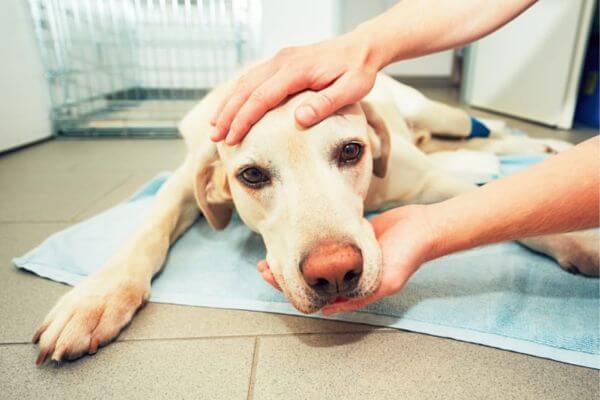Do you know what to do if your beloved furry friend has been poisoned? It’s a scary thought; unfortunately, it happens more often than we’d like.
Don’t worry – with the proper knowledge and action steps, you can be prepared to help your pup in their time of need. This article sheds light on the common symptoms of dog poisoning and what to do next.
From first aid for mild dog poisoning to when it’s best to see the vet, we’ve got you covered. So take a deep breath and start preparing for any possible situation – because, as they say, “it’s better to be safe than sorry’.
Common Symptoms of Dog Poisoning
If you’ve noticed unusual behavior in your pet, they may have been exposed to something toxic – typical signs of this can include vomiting, loss of appetite, and fatigue.
Other symptoms that can indicate poisoning in your dog include discoloration of the skin or eyes, difficulty breathing, excessive drooling or foaming at the mouth, seizures or muscle tremors, and even vomiting blood.
Take your pet to the vet immediately if any warning signs arise.

It’s also important to pay attention to changes in behavior. If your ordinarily active pup is suddenly lazy and doesn’t want to play anymore, this could be a sign that something is wrong internally.
Additionally, if your dog has an aversion to light or sound, seems confused or disoriented when awake, or appears unwell with no apparent cause. Dog poisoning should be considered a potential culprit.
In addition to watching out for physical symptoms and behavioral changes in your furry friend, there are other preventive measures you can take, such as keeping poisonous substances away from them at all times and never letting them roam off-leash where they could come across potentially hazardous materials like antifreeze which is highly toxic to dogs.
Remember that prevention is always better than cure, so it pays off to stay vigilant when caring for our four-legged friends!
Signs of Severe Dog Poisoning
Severe dog poisoning can be life-threatening, comparable to a ticking time bomb. If your dog has ingested risky foods or any other potential poisons, and you’re noticing more than mild symptoms, acting quickly is essential.
Severe symptoms of dog poisoning include trembling or shaking, difficulty breathing or shortness of breath (dyspnea), seizures or convulsions, pale gums due to anemia or lack of oxygen in the bloodstream, collapse, and loss of consciousness.
If your pup is experiencing any of these aforementioned severe symptoms, take them to the vet immediately for treatment – don’t wait for the situation to worsen. Your vet will likely want to perform some blood tests that check for levels of organ enzymes such as AST and ALT, indicating if there is damage or inflammation in the liver.
They’ll also assess the pup’s hydration status by checking electrolyte values in their blood, which they use to diagnose acidosis (a condition where there’s too much acid in the bloodstream). The vet may also take a urine sample from your pup so they can test for toxins that are present in their system.
Try this “Bench And Field Holistic Natural Adult Dry Dog Food” – an exceptional food designed for dogs with acid-related issues in their body. Its formula is crafted to maintain the right balance of acid and base within your pet’s system, helping to reduce the risk of them developing acidosis.
It would be best to always practice dog poisoning prevention with your pup by keeping potentially toxic substances locked up and out of reach.
These substances could range from human medications and food items like chocolate or avocados – considered highly toxic when consumed by dogs – to household cleaners like bleach and antifreeze; all have dangerous consequences when ingested by our four-legged friends!
What to Do if Your Dog Has Been Poisoned?
Acting fast is critical; if you think your pup’s been poisoned, take them to the vet immediately.
Prevention measures are essential when minimizing the risk of dog poisoning, but sometimes accidents do happen. If you think your pup has been poisoned, there are a few steps that should be taken immediately:
- Make sure your dog is in a safe place where they can’t access any more potential toxins or poisons.
- Contact your local veterinarian for emergency care instructions and bring any packaging or labels from items that may have caused the dog poisoning.
- Monitor your dog’s symptoms closely and look for signs of severe dog poisoning, such as difficulty breathing, seizures, or vomiting blood.
- Administer basic first aid like inducing vomiting with hydrogen peroxide (if instructed by a vet) only if you’re sure what was ingested and it hasn’t been more than two hours since ingestion.

It’s also essential to stay informed about common household hazards like rodenticides, insecticides, plants, and medications that can be dangerous to pets. Knowing which substances can cause toxic reactions in dogs could help prevent accidental dog poisoning incidents from occurring in the future.
Even though prevention measures play an important role in keeping our furry friends safe, veterinary care is essential if you suspect they have been exposed to poison or toxins, so act quickly!
First Aid for Mild Dog Poisoning
Taking quick action is essential if you think your beloved pet has been exposed to a mild poison – time is of the essence!
Monitoring trends and taking preventative measures can help keep your pup safe. Regarding trends, Fetch Dog Park offers valuable insights into ensuring your furry friend gets the right amount of fun and exercise in a safe environment. Make sure to check it out to keep your dog engaged and protected.
First, it’s essential to identify potential poisons and remove them from the environment.
Everyday household items like antifreeze, rat poison, and fertilizer are all hazardous for pets.
If you suspect your pup may have eaten any of these substances, immediately take them to a vet or animal hospital.
In cases where your dog was exposed to something milder, like chocolate or medication meant for humans, there are still steps you can take at home to help treat poisoning in dogs.
Ensure your pup has plenty of water available, and try not to let them eat anything else until they’ve seen a vet.
If they’re vomiting excessively, try giving them half-teaspoon doses of hydrogen peroxide every 10 minutes (only up to three times).
This will help induce vomiting so they can get rid of whatever toxin is in their system before it causes further damage.
Your first instinct may be panic when you think your dog has been poisoned – but stay calm!
By taking fast action and monitoring trends in their behavior while implementing preventative measures, you can help ensure their safety and recovery.
Keep an eye out for signs like excessive drooling or lethargy, which could indicate the presence of toxins in their body – but don’t hesitate to seek medical attention if needed!
Why is Immediate Veterinary Care Crucial for Dog Poisoning?
If your pup displays any concerning behaviors, it’s best to act quickly and take them to the vet immediately.
The severity of dog poisoning can range from mild to life-threatening, and specific preventative measures, such as at-home care, might not always be enough.
Here are some symptoms that you should watch out for in your dog if they have been poisoned:
- Vomiting or diarrhea
- Foaming at the mouth
- Weakness
- Increased thirst
- Uncoordinated movements
- Seizures or tremors

If you notice any of these symptoms in your pup – even if it may seem minor – it’s essential to take them to a vet immediately for treatment and diagnosis.
Your vet will be able to determine the cause of the dog poisoning, assess its severity, provide supportive care (such as IV fluids), and give medication to reduce discomfort.
With proper medical attention, most dogs recover from mild poisonings without lasting effects; however, ignoring symptoms could lead to serious health issues.
Don’t wait until things get worse – seek help right away!
Frequently Asked Questions
How can I prevent my dog from being poisoned?
You want to make sure your beloved pup is safe from harm, and one of the best ways to do this is by preventing them from being poisoned.
To do this, you’ll need to secure any storage areas in your home that may contain hazardous materials or food items that could be dangerous for your dog. This includes cleaning supplies, medications, and even certain human foods.
Regarding food safety, always check the label before giving anything to your pet, and avoid feeding them table scraps or leftovers.
Taking these measures will help keep your pup safe and healthy!
What should I do if I think my dog has ingested poison?
If you think your beloved pup may have ingested poison, act fast! Take a deep breath and remember that many pet owners have been in similar situations.
For example, Jane’s dog Shadow accidentally ate some rat poison left behind by her neighbor. After quickly identifying the signs of dog poisoning, like vomiting, diarrhea, and lethargy, she got him to help with emergency treatments.
It’s essential to identify the signs of dog poisoning so you can take the necessary steps to ensure your dog’s safety. If you suspect your puppy has eaten something poisonous, contact a veterinarian immediately for advice on how to proceed.
What are the most common poisons that can affect dogs?
If you think your dog may have ingested poison, detecting the signs and understanding the toxicity levels is essential.
Some of the most common poisons affecting dogs include antifreeze, certain types of plants, insecticides, rodenticides, household cleaners, chocolate, and human medications.
Pay close attention to any changes in your pup’s behavior or physical appearance if you think they may have been exposed to something poisonous; symptoms can include vomiting, diarrhea, lethargy, or difficulty breathing.
If you identify any potential poisoning symptoms in your pet, contact a vet immediately for advice on how best to proceed.
What treatments are available for dog poisoning?
If your dog has been poisoned, don’t panic – the treatments available can help! Several measures can be taken to ensure a speedy recovery from vet visits to safety surrounding ingestion.
Picture your pup returning to its old self in no time – like a flame returning to life after being blown out by a gust of wind. Taking swift action is critical; once you suspect or confirm your pup has ingested something poisonous, contact your vet for advice and assistance in deciding on the best treatment for your beloved pet.
What are the long-term effects of dog poisoning?
If your dog has been exposed to pesticides or you suspect they have, it’s essential to understand the potential long-term effects.
Exposure to pesticides can cause a range of health problems for your dog, including neurological damage, organ failure, reproductive issues, and even cancer.
These conditions can become more severe if untreated and sometimes lead to death.
If you believe your dog has been poisoned, you must take prompt action to limit potential long-term health effects.
Conclusion
Awareness of severe dog poisoning symptoms is crucial for every pet owner. The well-being of our furry companions should always be our top priority. Immediate action is essential if you notice alarming signs like vomiting, foaming at the mouth, weakness, or seizures. Contact your veterinarian immediately or rush your dog to the nearest animal clinic. Remember, time is of the essence when it comes to potential poisonings.
You may feel overwhelmed right now, but staying calm is essential. If your dog has been poisoned, taking the proper steps quickly can help save their life.
If you want to make a difference, consider adopting a dog from Bone Voyage Dog Rescue. At Bone Voyage Dog Rescue, we understand the importance of providing all dogs with a safe and loving environment.
We are committed to rescuing and rehabilitating dogs in need, giving them a second chance at a happy and healthy life. By welcoming a new furry friend into your home, you save energy and experience the unconditional love and companionship that only a dog can provide.
Leap and make a lasting impact. Visit our website today and discover the joy of adoption with Bone Voyage Dog Rescue. We can give these deserving dogs a brighter future filled with love and care.
